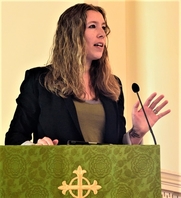

By Rev. Dcn. Erin Moniz, Assistant Chaplain, Office of the Chaplain, Berry College
At that time the disciples came to Jesus, saying, “Who is the greatest in the kingdom of heaven?” And calling to him a child, he put him in the midst of them and said, “Truly, I say to you, unless you turn and become like children, you will never enter the kingdom of heaven. Whoever humbles himself like this child is the greatest in the kingdom of heaven.” –Matthew 18:1-5
I’ve been reflecting on this passage from Matthew as I prepare a sermon about conversion. At our College Church we are doing a series on different words or phrases associated with the gospel so that our students develop a more robust understanding of their salvation and identity in Christ. I focused on this particular passage because while our English word “conversion” is not widely used in Scripture, “turn” or “change” embody the meaning of such words used to create a framework for understanding conversion. In this passage, Jesus uses a child both figuratively and literally to demonstrate a point to his disciples.
Turn and Change
I am often quick to roll my eyes and sigh, “Here they go again. Those ignorant disciples and their assumptions about power and prestige; asking things of Jesus with all the grace of a dumpster fire.” My own lack of grace for their mistakes notwithstanding, Jesus does more than just make a corrective shift. He does something so profound and familiar: He answers their question in a way that changes their question. Jesus is asking his disciples (and all of us who are followers) to turn, to change, and to become like this child. Not to become childish but rather to be receptive and without guile. The illustration of a child is a deliberate juxtaposition to the motivation behind their question. Like many whom Jesus encounters in the gospel narratives, the questions about the kingdom of heaven are not without baggage. These questions are not innocent inquiries from receptive minds eager to be shaped and transformed into kingdom people. They are laden with arrogance, insecurity, and misplaced ambitions.
Jesus is not just answering the question. He answers in a way that exposes the brokenness behind the question. This is why the command to convert, to turn around, is so profound and important. To truly understand even their own question much less the answer, they must turn and change. There is a paradigm shift where the powerful, privileged, astute, and celebrated are not valued by those accolades in the kingdom of heaven. The weak, repentant, broken, receptive, and of low esteem in society, are held up as the example of greatness. To be converted is an intersection of God’s grace to act and our response to that grace so that we might acknowledge our powerlessness and receive the transformative endowment of His love and identity.
A Continual Conversion
I am often frustrated in my prayers because I am unclear how God is answering them. I curate my questions so that God is trapped by my cleverness into only offering certain answers. If He gives me the answer I desire, then He gets to keep his status as a loving, relational God. But if he does not, I have asked the question in such a way so that any other answer would belie Him as cruel or unloving. Such is my evil genius.
Then I come to these passages (and there are many of this same kind) where Jesus easily hurdles my flawless trap by answering in a way that reshapes my question. Sometimes I am obtuse to His response because I am loathe to think He can answer in any way other than the options I have so generously presented to Him. Yet, in His love and will to transform me in sanctification, He shows me the values of His kingdom and calls me to convert my presuppositions. This is a grand mercy because my presuppositions are so tightly wound around my own privilege, station, and sin that I am dangerously blind to the way these shape my life and ministry. The disciples had a warped perspective on power, and I am guilty in the same way.
It is challenging and refreshing for me to be shaped by the very message I hope to relay to others. Just like the disciples in this passage, I pray we can all have our motives exposed and gently corrected so that conversion continues to turn us towards Christ and away from the darkness of our own sin.
